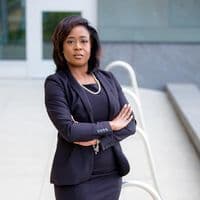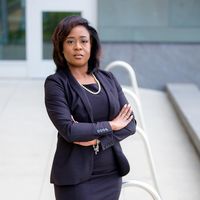My name is Habekah Cannon, and I became a lawyer so that I could defend the public. Public defenders are lawyers that are often thought of as being “overworked and underpaid,” taking on hundreds of cases at a time. Before I was fired from the Mecklenburg County Public Defender’s Office, I fought an uphill battle against a racist criminal "justice" system. I fought for every one of my clients and planned to keep doing so. I believe that by providing a holistic client-centered approach we will disrupt the narrative of mass incarceration and inescapable poverty that characterizes "the New South''. I believe everyone, regardless of ability to pay for a private lawyer, deserves a zealous advocate - someone that will fight the uphill battles with them in a system that is too often rigged against them.
This summer, my commitment to my clients included protesting in the streets for Black lives. It involved physically showing up, during a global pandemic, and providing mutual aid to people who had been arrested, caged, and abused by the hands of the State. It entailed filing a complaint against the officer who assaulted me with his bike during a protest to check his blatant abuse of power and protect others in the future. As a result, I was targeted and arrested on baseless charges. Despite law enforcement's obvious abuse of power, I did not receive any support from my former employer, instead I was terminated. I was not given any warning or disciplinary actions before being asked to resign for "not drawing wide enough margins between my work as an Assistant Public Defender and my activism." When I refused to resign, I was wrongfully terminated with no severance pay. My health care was cut before I even had time to schedule final doctor visits during a global pandemic. I was not allowed to transfer any of my files, and I was not allowed to contact any of my clients to explain how their cases would be handled.
This summer, I learned that defending the public is not exclusive to the courtroom. I learned that when communities come together to keep each other safe, incredible things are possible. This is why I am starting my own law firm, and why I need your help to do this. Over the summer we identified the need for a new kind of public defense: holistic, low-barrier, and wholeheartedly abolitionist. Our clients wIll not have to fill out an application for indigency-- they can just be referred to us, or approach us on their own if they need legal services and cannot pay. We will focus on serving people who are jobless, houseless and housing-insecure. We will defend them against misdemeanors that criminalize survival: charges like soliciting alms, failure to pay fare, trespass, larceny and prostitution. We will also take cases such as resisting a public officer and assault on a government official due to the fact that officers often tack on these charges to the poor, Black and Brown people as an intimidation tactic. We are a for-profit firm but we specialize in defending the indigent by raising funds, as a community, to cover bare essentials for a thorough legal defense.
Being a zealous advocate extends beyond the "resolution" of a case; it means connecting people to resources for housing, benefits and community care. It means filing to get past cases expunged, so that formerly incarcerated people can loosen the tight grip that the prison system has on their lives. We plan to loosen this grip and host free expungement opportunities for our clients. 1-in-7 North Carolina residents have had their license suspended; many because they cannot afford to pay fines and fees. We plan to host free driver's license restoration clinics, helping to assure that people in our community can get and keep a job, take their kids to school, and live their lives without fear of being arrested for driving without a license.
I have prepared for this work my entire life. My commitment to public service is evident by my professional associations and work inside and outside the courtroom. As a Gideon's Promise fellow, I am part of a network of attorneys dedicated to improving access to justice for marginalized people. For the past two years, as an Assistant Public Defender, I worked directly with my clients and their families in hopes to yield the best possible outcome in court. This commitment required me to work past the 40 hours a week I was paid; it required me to go into the office early, stay late, and to even come in on the weekends to prepare myself and my clients for court. My clients are not "cases": they are people just like you and me, with their own stories, families, futures, and my commitment to them extends far beyond the courtroom.
In 2019, I co-authored a section of the American Civil Liberties Union 2019 report "At All Costs: The Consequences of Rising Court Fines and Fees in North Carolina." This report addresses North Carolina’s debtors' prison that criminalizes people for their inability to pay court fines and fees. Not only are people plagued by court costs, people are also entrapped in the criminal justice system because they are constantly being charged with crimes that are directly correlated to poverty.
Some people believe that my dedication to my clients, to jail support, to my community and to an abolitionist future is a liability. However, I believe it is one of my most compelling qualifications and assets to defend the public. I believe that mutual aid --one dollar, one court date, one person at a time-- really does keep us safe. If you are able to financially contribute to Charlotte's first abolitionist, community-based legal defense firm, all donations will go directly back into legal services for our clients, we would greatly appreciate your support. Together We Can! We believe that is the way it should be.


